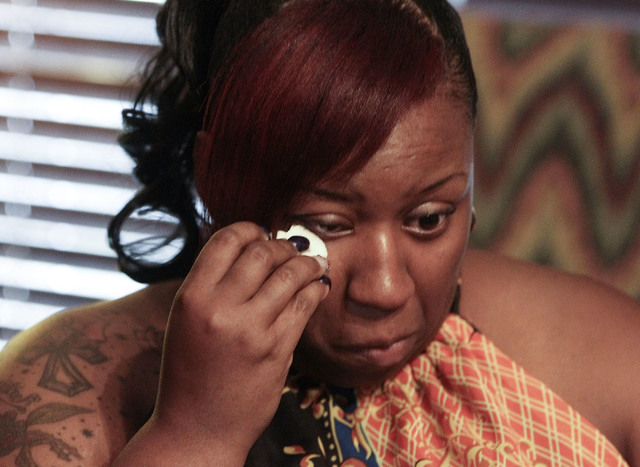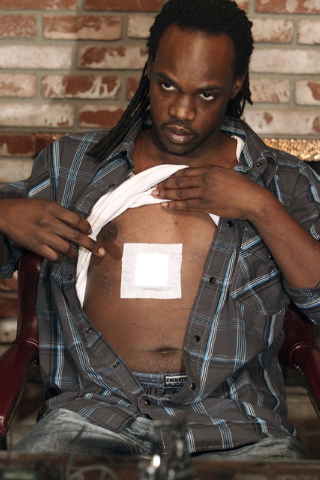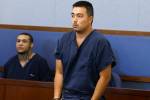Unarmed man shot by officer files federal lawsuit against department
It wasn’t the first time Antoine Hodges had a Las Vegas police officer point a gun at him.
But unlike his prior encounters with police, Hodges felt officer Jason Evans wasn’t interested in resolving anything peacefully.
“I was in more fear with (Evans),” he said. “I could see in his emotion that it wasn’t his intent to just talk and diffuse the situation,” Hodges said Friday, 11 days after the Oct. 21 shooting at a 7-Eleven.
Police said Evans, 29, mistook Hodges, 30, for a suspect in a pair of killings the previous night at an apartment complex. Evans confronted Hodges about 10:30 p.m. inside the store, near Nellis Boulevard and Stewart Avenue.
Police said Evans ordered Hodges to show his hands and exit the store. Hodges said the whole incident started suddenly, ended quickly and he doesn’t recall exactly what Evans said.
“All I remember was me yelling at him, “I’m not your suspect. I know for sure I’m not your suspect,” Hodges said.
Hodges said he panicked when he saw the officer’s gun and backed away, trying to calm the officer, he said. He raised his left hand, in which he held his car keys and phone. But as he reached behind him with his right hand, Evans fired one shot, striking Hodges in the stomach.
“There was no warning. He just fired,” he said.
Hodges, who had just paid for fuel, was putting his change in his pocket when he was shot, he said. He was unarmed.
He survived the shooting and was released from the hospital hours later. He is not a suspect in the homicide investigation and wasn’t charged with a crime.
His lawyers, Cal Potter and Joseph Reiff, filed a federal civil rights lawsuit against Evans, Clark County Sheriff Doug Gillespie and the Metropolitan Police Department Friday, a day after police released video of the shooting.
Hodges and his wife, Annette, had a short news conference in Potter’s office Friday.
Potter said Evans wrongfully pegged Hodges as a killer without any evidence.
“He was confronted with a police officer with his gun drawn in ready-fire mode. At that point in time Antoine did not face a situation where an officer was trying to find out information, but had made a determination to fire,” Potter said.
Potter said Evans created and escalated the situation, violating his department’s training policies.
Police in Las Vegas have preached for officers to “de-escalate” situations since a rash of controversial police shootings in the last five years prompted a Department of Justice review and a Review-Journal investigation of police policies.
Potter said the officer didn’t wait for back-up from fellow officers and went inside a confined area by himself with his gun raised. If Hodges had actually been the armed killer Evans believed, their gunfight could have been deadly for the officer or innocent bystanders, he said.
“The officer initiated a gunfight in a store with other people in that store. All of his training told him he was supposed to set up, make sure he had backup come, and be in control of the situation. He didn’t do that. He escalated it, and that’s what’s wrong.”
Police said Hodges, a black man with shoulder-length dreadlocks, matched the description of the suspect in the homicide case.
But Hodges said he believes he was stereotyped. He said he first encountered the officer as he drove his Chevrolet Tahoe north on Nellis. Evans was driving south on Nellis as both cars stopped at the light.
Hodges turned left onto Stewart, heading west, and the officer turned east. At some point, the officer turned around to follow him into the store’s parking lot, he said.
He doesn’t believe the officer could have seen his hair, as his car’s windows are heavily tinted and their headlights would have blinded any view through the windshield.
“I couldn’t see him. I know he couldn’t see me,” he said.
Hodges said detectives later told him at the hospital that the suspect in the homicide case had cornrows, not dreadlocks.
“I feel he basically just judged me by being an African-American. I really felt that he played a racial card,” he said.
Potter said he’s concerned about another unarmed black man being shot in Las Vegas. In the last five years, Trevon Cole, Stanley Gibson and Lawrence Gordon, all unarmed black men, were shot by police.
Potter represented Gibson’s widow in her lawsuit and recently settled the case against officer Jesus Arevalo and the department for $1.5 million. He also represents Gordon, who survived being shot in the leg by officer Jacquar Roston. That lawsuit is pending.
“These are all young, black, African-Americans that are being victimized… (they’re) unarmed, and being shot by the police mistakenly. And I think we need to be focusing on why that happens,” he said.
Annette Hodges said she found about the shooting when her husband didn’t come home from the gas station near their home. He was filling up the car’s tank for her to go to work, she said.
She was walking to the store when she saw police cars and paramedics surrounding their Tahoe in the parking lot. Officers said her husband had been in a shoot-out, but she had to wait to speak to detectives for any information, she said.
“I’m asking if my husband was alive, dead, where? What’s going on?” she recalled, her voice quivering.
She found him hours later at University Medical Center, where Antoine Hodges said he was treated like a suspect. He was handcuffed after the shooting and an officer put a knee into his back, something Potter notes wasn’t shown on the video released by police.
“It’s certainly not the complete tape,” he said. He added that he isn’t sure if Evans committed a crime.
“We don’t know yet. All we know is what Metro has been willing to show last night, but we know they weren’t willing to cooperate in terms of turning anything over to us,” he said.
Evans was placed on routine, paid administrative leave pending a criminal review by the Clark County District Attorney’s office and an internal review.
Hodges, a line cook at Hash House A Go Go at the Plaza Hotel and the father of three children, can’t earn money while he heals, however.
“I’m not on paid leave,” he said. “I can’t support my family, and he can support his family, which I feel is unfair.”
He has trouble sleeping, moving his upper body or holding his 1-year-old child, he said. The baby cries for him, but he can’t do anything.
“It automatically depresses me,” he said.
Hodges has a variety of arrests on drug crimes in Las Vegas and is familiar with law enforcement but Evans’ behavior was excessive, he said. He was confused and scared, but he wasn’t trying to resist the officer’s commands.
Asked if he thought Evans should be fired, Hodges said he simply wanted accountability.
“Just justice. Just, you know, the right thing. I just want the right thing done. Fair is fair and wrong is wrong.”
Contact reporter Mike Blasky at mblasky@reviewjournal.com or 702-383-0283. Follow @blasky on Twitter.






























